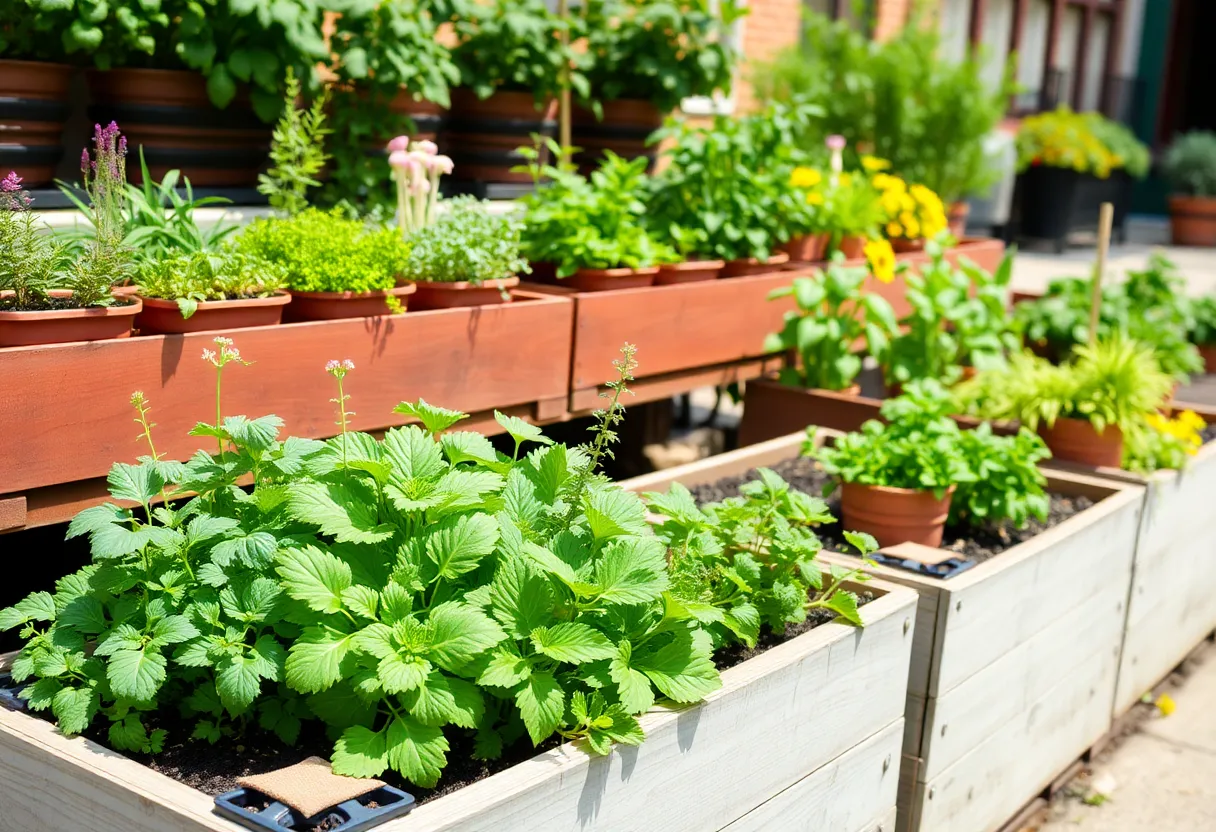How to Create a Beautiful Edible Garden in Philadelphia’s Urban Landscape
Transforming an urban space into a productive and aesthetically pleasing edible garden in Philadelphia is a highly achievable endeavor. Urban gardening not only supplies fresh produce but also enhances the environmental and visual appeal of neighborhoods. Achieving success in this context requires strategic planning, understanding of space constraints, and appropriate plant selection tailored to the local climate and urban environment. The following comprehensive guide offers practical insights into establishing a thriving edible garden within Philadelphia’s unique cityscape.
Assessing Your Space
Before initiating your garden, conduct a thorough evaluation of your available space. Awareness of the specific characteristics and limitations of your site forms the basis for informed decisions on layout and plant choices. Locations for urban gardening span balconies, rooftops, community plots, and vacant lots. It’s essential to analyze the following factors:
Sunlight Exposure
Most edible plants demand at least 6 hours of direct sunlight daily. To optimize plant growth, observe your site during different times of the day and document sunlight patterns. Full-sun plants flourish in unobstructed areas, while some varieties tolerate or prefer partial shade—a critical consideration for shaded balconies or courtyards. Adequate sunlight influences both the quality and quantity of your harvest.
Soil Quality
Urban soils often face challenges such as compaction, contamination, or nutrient depletion. To counteract these issues:
- Use raised beds or containers filled with high-quality, well-draining soil mixes.
- Implement soil testing to evaluate pH, nutrient levels, and potential contaminants.
- If soil quality is poor, consider expanding your planting medium with compost, organic matter, and amendments tailored to specific plants.
Regular soil management enhances plant health and productivity, especially in compacted or contaminated urban soils.
Choosing the Right Plants
Selecting appropriate plants depends on Philadelphia’s USDA Hardiness Zone 7b, characterized by cold winters and humid summers. Resilient, adaptable varieties will thrive under local conditions, ensuring a bountiful and sustainable harvest.
Herbs
Herbs are highly adaptable to small spaces and are invaluable for culinary use. Ideal for container planting, herbs include:
- Basil: Thrives in full sun; deadheading encourages bushiness.
- Parsley: Tolerant of partial shade; enriches dishes with vitamins.
- Thyme: Drought-resistant and space-efficient, suited for containers.
- Chives: Easy to grow, adds mild onion flavor; suitable for pots.
- Mint: Vigorous, requires containment; perfect for teas and cocktails.
- Cilantro: Fast-growing; essential for diverse cuisines.
Container gardening offers flexibility, allowing for mobility, better control over soil conditions, and maximizing limited space.
Leafy Greens
Nutrient-dense and quick to grow, leafy greens are ideal for urban gardens, particularly in containers or raised beds. Recommended options include:
- Lettuce: Varieties like Romaine and Butterhead grow rapidly in cooler seasons.
- Spinach: Prefers cooler temperatures; suitable for early spring or fall planting.
- Kale: Hardy; tolerates diverse conditions, providing multiple harvests.
- Swiss Chard: Visually striking with colorful stems; grows in various light conditions.
These greens can be harvested multiple times, ensuring a continuous fresh supply throughout the growing season.
Fruiting Plants
Incorporate fruiting plants for diversity, flavor, and visual interest:
- Tomatoes: Both cherry and larger varieties thrive in full sun; require well-draining soil.
- Strawberries: Serve as ground cover; benefit from full sun and attract pollinators.
- Blueberries: Grow in containers; demand acidic, well-drained soil and partial shade.
- Dwarf Peach Trees: Suitable for containers; provide fresh fruit within limited space.
Prioritize plants with specific environmental needs to optimize yield and plant health.
Urban Gardening Techniques
Employing specialized gardening approaches enhances productivity and maximizes available space in urban settings.
Vertical Gardening
Vertical gardening involves growing plants upward, saving horizontal space. Utilize trellises, wall-mounted planters, and hanging baskets for:
- Climbing plants such as beans, cucumbers, peas
- Decorative wall crops that also produce harvestable produce
Vertical systems improve airflow, reduce pests, and add visual structure to your garden.
Container Gardening
Containers are critical in limited space, offering:
- Flexibility in layout and plant arrangement
- Enhanced control of soil quality and moisture levels
- Portability, allowing plants to be moved as needed for sunlight or protection from weather
Choose containers with adequate drainage holes and use premium potting mixes rich in organic matter.
Raised Beds
Raised beds elevate root zones, improve drainage, and extend growing seasons by warming soil faster in spring. Constructed from wood, stone, or recycled materials, they facilitate easy maintenance and soil management.
Community Resources
Philadelphia’s urban gardeners benefit from numerous resources, though this guide remains strictly informational. Local community programs, urban farming initiatives, and garden workshops provide invaluable knowledge, supplies, and support. Collaborating with neighbors or forming garden groups can amplify success through shared experiences and resource pooling.
Maintenance & Best Practices
Successful gardens necessitate consistent care. Practices include:
- Regular watering—aiming to keep soil consistently moist, especially in containers.
- Mulching—reduces water loss, suppresses weeds, and maintains soil temperature.
- Pruning—promotes healthy growth and increases air circulation.
- Integrated pest management—combines physical barriers, biological controls, and organic pesticides to prevent infestations without harmful chemicals.
- Crop rotation—prevents soil exhaustion and minimizes pest buildup.
Consistent monitoring and prompt intervention optimize plant health and yield.
Conclusion
Creating a beautiful edible garden in Philadelphia’s urban environment demands knowledge, foresight, and diligent care. By thoroughly assessing your space, choosing appropriate plants, and utilizing space-efficient gardening techniques, you can cultivate an environmentally sustainable and visually appealing garden. This effort enriches your personal well-being, enhances urban aesthetics, and fosters community engagement. Urban edible gardening is a powerful way to reconnect with nature, promote local food systems, and contribute to greener, more sustainable cities.
FAQ
What are the best edible plants for small urban spaces?
Herbs like basil, parsley, thyme, chives, and mint are ideal for limited areas. Leafy greens such as lettuce and spinach also thrive in containers, as do fruiting plants like strawberries and dwarf varieties of tomatoes and peaches.
How can I optimize sunlight in a shaded urban environment?
Maximize sunlight exposure by positioning containers and raised beds on south-facing balconies or rooftops. Use reflective surfaces like walls or pavements to bounce additional light. Select partially shade-tolerant plants when full sun isn’t available.
What soil modifications are recommended for urban gardens?
Incorporate high-quality compost and organic matter into existing soil. Use raised beds filled with well-draining, nutrient-rich mixes. Conduct soil tests to identify deficiencies or contamination and amend accordingly.
How do I prevent pests in an urban edible garden?
Implement physical barriers such as row covers and netting. Practice crop rotation and plant companion crops that repel pests. Use organic controls selectively, avoiding harmful chemicals.
What is the ideal watering schedule for container plants?
Maintain consistent moisture, watering when the top inch of soil feels dry. During hot weather, daily watering may be necessary. Ensure containers have drainage holes to prevent waterlogging.
Key Features of an Urban Edible Garden in Philadelphia
| Feature | Details |
|---|---|
| Climate Compatibility | USDA Zone 7b; handles cold winters, hot summers |
| Space Optimization | Vertical gardening, containers, raised beds |
| Plant Selection | Herbs, leafy greens, fruiting plants suited for small spaces |
| Soil Management | Raised beds, soil testing, compost enrichment |
| Watering Techniques | Consistent, monitored watering, mulching |
| Community Engagement | Local groups, shared resources, knowledge exchange |
Author: STAFF HERE PHILADELPHIA WRITER
The PHILADELPHIA STAFF WRITER represents the experienced team at HEREPhiladelphia.com, your go-to source for actionable local news and information in Philadelphia, Philadelphia County, and beyond. Specializing in "news you can use," we cover essential topics like product reviews for personal and business needs, local business directories, politics, real estate trends, neighborhood insights, and state news affecting the area—with deep expertise drawn from years of dedicated reporting and strong community input, including local press releases and business updates. We deliver top reporting on high-value events such as Mummers Parade, Philadelphia Flower Show, and Thanksgiving Day Parade. Our coverage extends to key organizations like the Greater Philadelphia Chamber of Commerce and United Way of Greater Philadelphia, plus leading businesses in telecommunications, food services, and healthcare that power the local economy such as Comcast, Aramark, and Children's Hospital of Philadelphia. As part of the broader HERE network, we provide comprehensive, credible insights into Pennsylvania's dynamic landscape.





